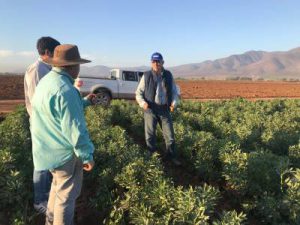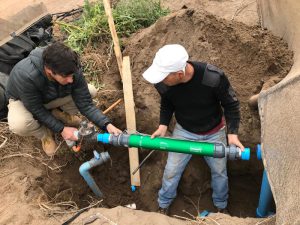Podcast: Aqua4D on Chile’s Radio Agricultura
This is an extract from a recent interview given to Radio Agricultura in Chile, where Felipe Villarino discusses the 2030 Water Awareness program and how new technologies like Aqua4D can help address the water crisis in Chile. For the full interview (in Spanish), see the YouTube link to the left.
Interviewer, Veronica Diaz: Today we are going to talk about a program that seeks to transfer a real solution to the country’s water problems in most agricultural areas.
This is the 2030 “Water Awareness” program for agriculture, which among other things, is developing a responsible production program for avocados, with 20 to 25% less water consumption thanks to Aqua4D technology.
What’s it all about? We are going to ask Felipe Villarino, General Manager of IST Group who is with us this morning. Felipe, before you explain this technology, I would like to know how critical the water situation in Chile is, from your point of view for the agricultural industry?
Felipe: Look, today Chile is effectively facing an increasingly serious water situation, because 76% of the surface today is affected by droughts, desertification and degraded soils.
Along with this is the agricultural growth that is projected in the country. Agriculture is a very important industry for the country’s economic development, and agriculture consumes 70% of the water. Therefore today, especially the projects that we have focused on, which have been in areas that have water scarcity such as the North, Coquimbo, La Serena, we find that there are serious problems where producers have already had to migrate from their lands, and if they find water, they are very salinized waters. Therefore, today the issue of water scarcity is a reality and is a problem for growers.
Q: But would you say that we are in an emergency, a dangerous situation?
Felipe: Chile is a fortunate country in terms of water, however, today consumption is increasing: today the water footprint per person is 3200 L, and this places Chile within the 30 nations with the highest water risk. Water consumption has risen 1% each year since the 1980s, and by 2050 will generate an increase of 20%-30%, therefore Chile has to prepare for this. Because it is one thing to be able to continue developing and generating the agricultural economy, but it’s important to integrate new technologies that allow us to make efficient use of this scarce resource.
Q: And what is this Aqua4D technology?
Felipe: This is a technology developed in Switzerland, and the innovation makes it possible to molecularly restructure the physical composition of water. And what does that allow? It allows water molecules to better hydrate, therefore when this water makes contact with soil and plant, we begin to see a series of benefits. Among these are greater absorption and penetration into the soil. Therefore, a grower begins to regulate the irrigation. If they were watering daily and move on to every other day, we begin to decrease that water consumption, and that is where we see the benefit of 20% or 30% percent water savings. Because the water percolates better, enters the micropores, is retained in the soil, and so the grower does not have to water so frequently.
It also helps avoid intensive leaching of salts. Today, for example, in the northern regions we see great problems in soil salinity, and what they use today are very powerful, very strong washes, with a lot of water consumption – 14hrs, 18hrs at a time, – in order to eliminate these salts. What Aqua4D suggests is “forgot that heavy leaching, and maintain a constant low flow irrigation”, and these micro-leachings also allow the farmer and the plant to develop as it should.
Q: OK, so it is a technology that acts on the basis of a resource that already exists, and that basically makes everything more efficient.
Felipe: Yes, it makes it completely more efficient. One of the impacts is water saving, specifically. But it also makes the entire irrigation system more efficient. By better dissolving the organic and mineral materials, it prevents encrustation in the irrigation system, allowing for a homogeneous irrigation, allowing the pumps to function more adequately. We also see energy savings because of this. The plant also begins to obtain the minerals it requires since we help remove the salts from the soil, and increases in production begin to be seen.
We have had cases around the world, where less water has been used and quality and production have been increased. And that is a bit of the paradigm shift that we are trying to make known here in Chile today.
Q: Less water, better quality and production.
Felipe: Exactly.
Q: Did you mention that this technology comes from Switzerland?
Felipe: From Switzerland, yes.
Q: And what results have you had, how has it been there over time? In which other countries is it being applied?
Felipe: Today the presence of Aqua4D is in more than 40 countries, here in Latin America originally through Brazil several years ago, and we as IST Group brought it to Chile this year, and it is a paradigm shift.
Q: So it didn’t exist here before…
Felipe: It didn’t exist. Today it is already in Peru, Argentina and Chile, and in Brazil as a separate market, but it is in 40 countries in total. They have worked in countries in North Africa with soil conductivity above 10EC, so when you bring it here to Chile they have a very powerful impact. Our challenge today is affecting change, because it is an innovation, a new technology, which must be demonstrated in the field, and that is what we are doing. Today the projects we have with our clients are projects that we are demonstrating with empirical and concrete results of how we managed to make the impact. Today in countries like France, Germany, Switzerland, Aqua4D is a consolidated technology.
Q: Has it taken time?
Felipe: It’s been 15 years now- the company turned 15 last week! It has been developing the technology every year, and today it has been one of the internationally recognized companies as one of the best innovations, because Aqua4D also aligns with all the sustainability objectives that the UN has, meeting 11 of the 17 SDGs. Therefore it is also a technology that has been recognized for its sustainability and for supporting the challenge of climate change.
Q: And now it’s arriving in Chile…
Felipe: Yes, this year we already have projects in the North, and we are trying to generate water awareness through this program, do things differently.
Q: So this technology works in the same way for all purposes and for any type of crop… But is there some way of doing it faster or slower, or does it always work the same?
Felipe: This always works the same. What we do before evaluating a project is first to ask for a water analysis, to know what type of water we are going to deal with, therefore we can also predict in a certain way how it will behave. And what we always try to emphasize is that Aqua4D does not do magic, what we do is treat the water and then the irrigation management in the field. Why? Because we then do a consultation with the client and follow up. That is, if our goal is to reduce water consumption, well, we will have to monitor soil moisture: tensiometers are installed and we start doing a joint work, and where we agree that if the treated water has more moisture available in the soil, we begin to modify and adapt the irrigation and it generates efficiency.
Q: Great …
Felipe: So it’s a joint work with the producer …
Q: How are you managing to transfer the technology to the farmers, as you mentioned at the beginning through these private and public entities?
Felipe: Today we are generating several alliances, with universities, with INIA, also with specific studies on water efficiency … as I said, we also have support from the embassy, where we will soon have breakfast at the embassy residence inviting authorities, the National Irrigation Commission, and to be able to publicize what we are doing, and from there it is directly going to producers and being able to transfer the technology and make it known. We are doing events up and down the country.
Q: So it’s absolutely direct transfer …
Felipe: Exactly …
Q: And how can a farmer access this technology?
Felipe: Our website has all information, international studies regarding the technology, and people can contact us there. We then schedule a meeting in the field, see the needs of the producer, and see what the reality is on the ground. Based on that, we work together on the project.
Q: Felipe Villarino, General Manager of IST Group, thank you very much for having been with us this morning, talking about this interesting technology, Aqua4D, which is really innovative. Congratulations and good luck!
Felipe: Thank you very much.
- Switzerland
Water treatment

Aqua4D agronomists consulting in Northern Chile

Installation of another Aqua4D system in Chile, Spring 2019


